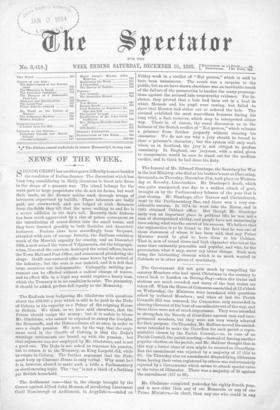The Ardlamont case—that is, the charge brought by the Crown
against Alfred John Monson, of murdering Lieutenant Cecil Uambrough at Ardlamont, in Argyllshire—ended on Friday week in a verdict of " Not proven," which is said to have been unanimous. The result was a surprise to the public, but as we have shown elsewhere was an inevitable result of the failure of the prosecution to harden the many presump- tions against the accused into trustworthy evidence. For in- stance, they proved that a hole had been cut in a boat in which Monson and his pupil were rowing, but failed to show that Monson had either cut or ordered the bole. The accused exhibited the most marvellous firmness during his long trial, a fact, however, which may be interpreted either way. There is, of course, the usual discussion as to the fairness of the Scotch verdict of " Not proven," which releases a prisoner from further jeopardy without clearing his character. We do not see why a jury should be bound to clear a prisoner's character; but the system will only work when, as in Scotland, the jury is not obliged to profess unanimity. In England, one juryman, with a mind given to compromise, would be sure to stand out for the medium verdict, and to think he had done his duty.


































